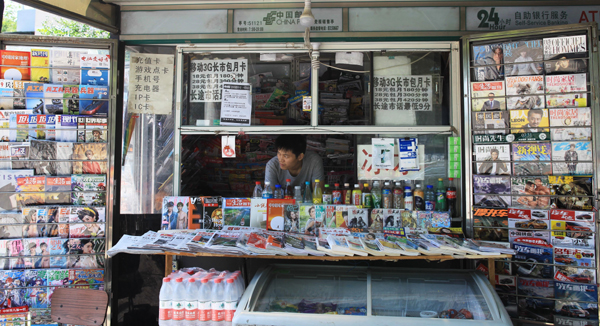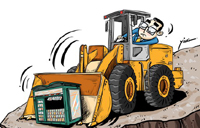 |
|
A vendor at his newsstand in Beijing's Chaoyang district on Aug 14. Many newsstands were recently removed from the streets as part of urban management measures. Zhu Xingxin / China Daily |
 |
| No standing in the way of 'progress' |
 |
| Program banks on 'information islands' |
Her breakfast would be incomplete without the Chinese-language Bejing Times newspaper.
But for the past two weeks, that is exactly what she has been suffering: There no longer seem to be any copies of the daily on the stands.
Finding it hard to stomach, Ma goes to another newsstand near Andingmen in Dongcheng district. Only after the hourlong bus journey can she get ahold of the newspaper.
"What can I do? I have been reading the paper every day for the past three decades since I retired," Ma said.
"Once, the paper was sold out at the Andingmen newsstand. I had to find it at another location."
Late in July, Beijing's Chaoyang authorities removed 72 newsstands in the district. The move angered numerous readers as well as residents who felt it was draconian despite the reasons cited by urban management.
Following the move, the Beijing Newspapers and Periodicals Retail Company, which handles publications like the Beijing Times, stopped distributing daily newspapers to newsstands in Chaoyang.
Many like Ma feel the move has left them with fewer options to stay ahead of the news, even as they are left out in a swiftly changing Chinese media market that focuses on online offerings and neglects the continuing needs of loyal followers of traditional print and its providers.
"I cannot live without reading the newspapers. I don't know who made the decision to remove those newsstands. Don't they read the newspapers and magazines? Don't they care about the needs of the residents?" Ma asked.
Zhao Yumei, a spokesman for the Beijing Newspapers and Periodicals Retail Co, which is under the Beijing Post Office, said it stopped distributing dailies to newsstands in Chaoyang to avoid losses "in case more newsstands were removed".
The removal of the newsstands has cost vendors like Cui Meiling and her husband their only means of livelihood.
In 1999, the couple were out of work. With the help of the neighborhood committee, they started operating a newsstand near Chaoyang's Dawanglu subway station.
Cui, 46, said the newsstand had been the sole source of income for the family and never expected it to be removed overnight.
Chengguan, or urban patrol officers, told her they would remove the newsstand on July 31, she said.
Cui said she packed their newspapers and magazines before the officers arrived the next day.
"They lifted the newsstand with a crane and placed it onto a truck. I never saw it again," she said.
"The chengguan said the Asia-Pacific Economic Cooperation meeting was going to be held in Beijing soon, and my newsstand affected the capital's appearance.
"My newsstand was listed as a three-star newsstand during the 2008 Beijing Olympic Games period. How can it suddenly affect the city's appearance?"
The chengguan also told her the newsstand was too close to the subway station, Cui said.
"But there are two illegal makeshift news booths just 2 to 3 meters from the entrance of the station. And the chengguan never bothered them. I have a business license for operating my newsstand so why are they removing it?" she asked.
Cui said her parents and her husband's parents are reaching 80 years of age and her 18-year-old son will start college in September. The removal of their newsstand has put the family under tremendous pressure.
"Before 2008, we could make more than 7,000 yuan($1140) a month. The business was significantly affected by the emergence of online media but we could still make more than 3,000 yuan to 4,000 yuan a month," she said.
"That's all gone now."
